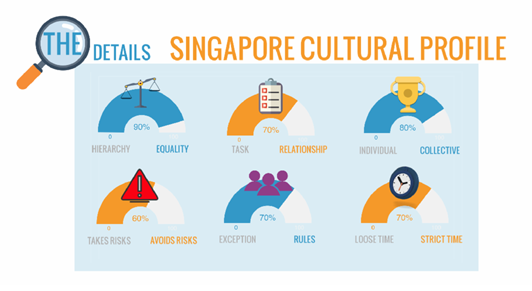As anyone who has completed an international assignment will tell you, each country has cultural differences and norms that can make expatriate life challenging. In this post, we will examine some of the aspects of culture in Singapore, a common location for international assignments. Below, our long-time trusted partner, IOR Global Services, provides important information for successful cultural integration.
Quick Facts
- Group Oriented & Relationship Focused: In Singapore, the notions of family, nation, and community are primary. Development of strong personal relationships with partners and customers is crucial and can take a considerable amount of time.
- Competition/Cooperation: Singaporeans can be intensely competitive between groups and individuals but always within the constraints of in-group harmony and cooperation.
- Hierarchy: Status and rank determine the structure of all groups and organizations within the country. Management style tends to be authoritarian with upward dependence and not much tolerance for initiative.
- Tolerance for Ambiguity: Strong social rules and public laws create a safe environment in which there is plenty of room for individual competition and commercial risk taking.
- Exact Time: A strong business culture demands strict scheduling and punctual behavior. Tardiness is perceived as a sign of disrespect and all business and social functions start on time.
- Watch Out! Showing emotions, interrupting, or raising one’s voice is considered improper and disrespectful.
Fun Facts
- Singapore has one of the world’s busiest cargo seaports, with 37 million containers passing through the Port of Singapore compared to the USA’s busiest seaport in Los Angeles at 6.5 million cargo containers.
- Singapore has four official languages: Chinese, Malay, Tamil, and English, plus an unofficial dialogue “Singlish,” which is based on English with elements of the other three languages.
- Freedom of worship is constitutionally granted, and you may encounter Singaporeans discussing religion openly.
Communication in Singapore
- Indirect: A focus on relationship development and the concept of “face-to-face” translate into preservation of harmony and dictate an indirect style in public. Disagreement and negative replies are muted, especially with superiors. Disturbing information may be conveyed in nonverbal channels or via a third party. There are many ways of saying “no” without uttering the word. Relationships determine the nature of communication and level of directness.
- Emotionally Restrained: Deference to harmony and cooperation require self-control and restrained emotional expression. Losing one’s temper causes loss of face to both the offended and the offender. Negotiations proceed slowly, cautiously, patiently, without emotional display, seeking compromise. A signed contract does not preclude later re-discussing “settled” points.
- Formal: In formal settings, titles and family names are used but business among acquaintances is conducted on a first-name basis, although hierarchy is always respected and acknowledged. Meetings are typically formal with reserved behavior, limited emotional display, and attention to hierarchy in the room. Singaporeans prefer formal recognition of space, particularly with the elderly who are treated with reverence. Eye contact is intermittent, and holding a gaze is considered very challenging and impolite.

*Image courtesy of IOR
Want to learn more about an assignee’s day-to-day life in Singapore (or any other country)? Please contact your Aires representative.


